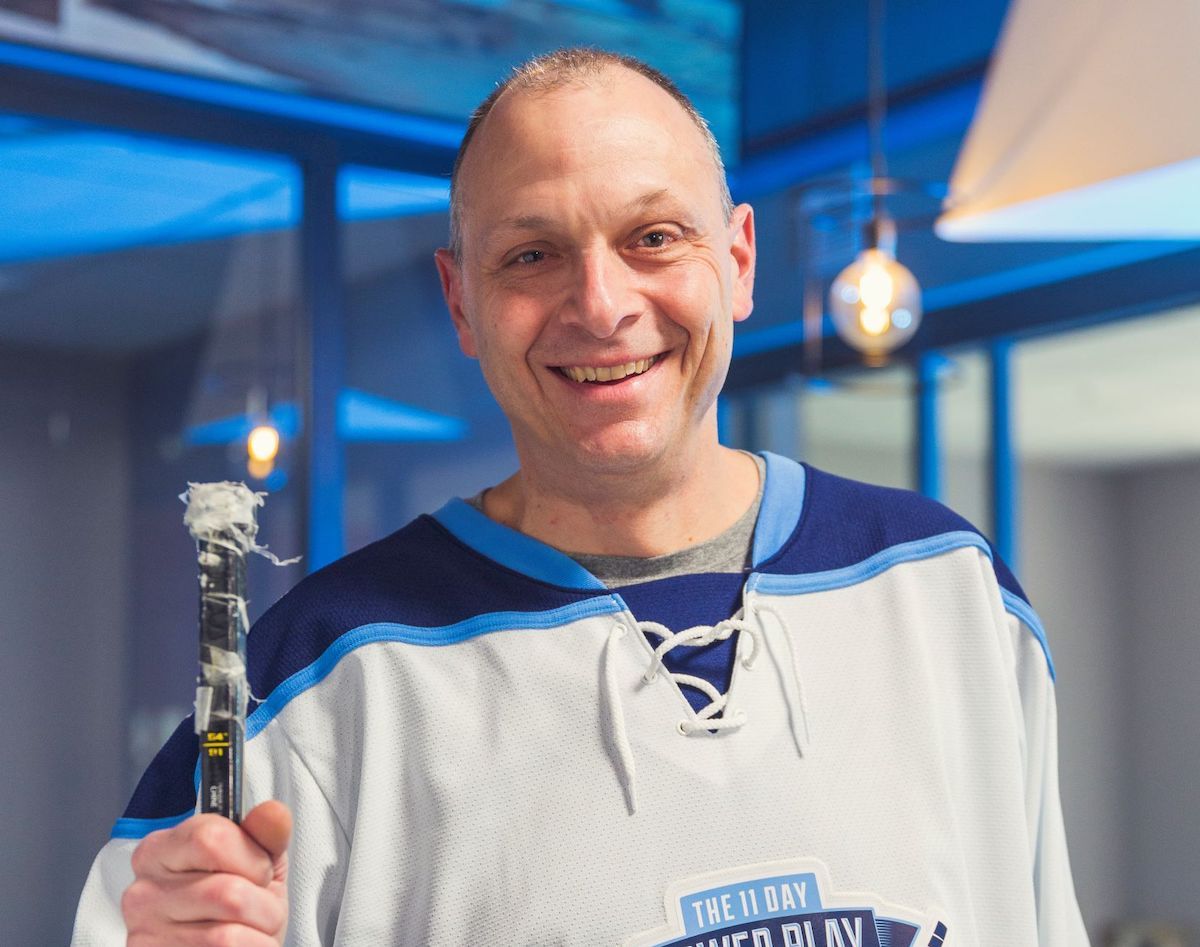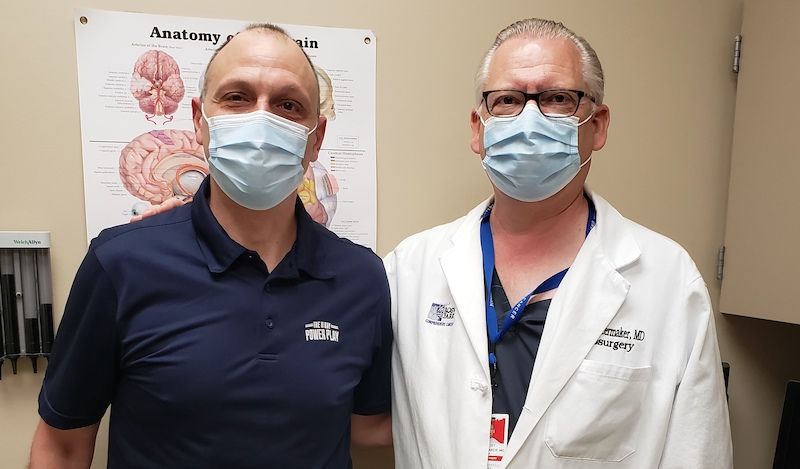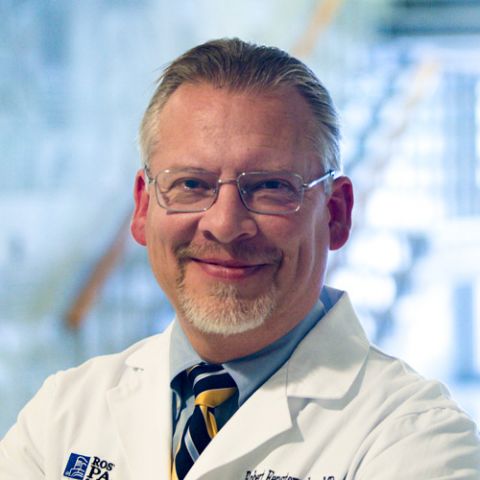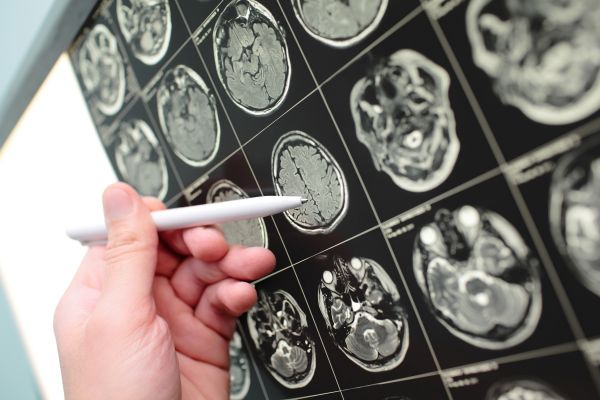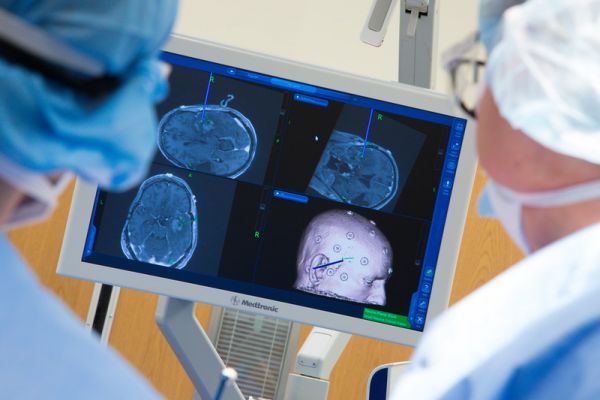As the horn sounded on the first-ever 11 Day Power Play in 2017, the players were exhausted and sore but proud of all they accomplished, on and off the ice. The game would set the world’s record for the longest hockey game and raised more than $1 million to benefit research programs at Roswell Park Comprehensive Cancer Center.
Peter Merlo was among the proud faces on the ice that night. Through his courage, strength and stamina for his on-ice feats, Peter’s unique journey to this moment began 11 years earlier.
Peter always kept active. In addition to basketball and tennis, he started playing hockey in his 20s.
“I had so much fun learning the sport,” Peter remembers. “I always wanted to try it and started skating a bit. I was getting into playing more and more. At one point, I was probably on the ice three to four times a week. I loved it.”
He was slowed a bit by constant headaches and ringing in his ears.
“I had some tinnitus and didn’t think anything much of it. I had been living with headaches pretty much as long as I could remember.”
Peter had just switched primary care doctors and was prescribed decongestants, thinking it might be a bad sinus issue.
“The headaches didn’t go away. I always had some sort of medicine in my pocket. I was pretty much taking the maximum dose of whatever my doctor recommended every single day to manage the pain.”
Peter was a new father, and life wouldn’t slow down just because he wasn’t feeling well. He was suffering through the pain, but taking the ice every week helped clear his head and made him feel a bit better.
In late 2005, things started to go downhill.
Worsening symptoms
“While rolling around with my son playing on the floor, I would feel this tremendous pressure in my head. I would explain it like vertigo. I was out of sorts; extremely dizzy and nauseous.”
Peter began waking up every morning feeling very sick.
“I figured it was an inner-ear issue. That would explain some of my symptoms, but then I would start each day by vomiting. This went on for a couple of months. I ended up going back to my doctor, who then referred me to an ear, nose, and throat specialist.”
He didn’t know it, but time was running out.
A difficult diagnosis
“After I got an MRI, I’ll always remember a call coming to my house on a Saturday morning,” he says. “I know that’s not normal, and it must be the results of my scan. My wife picked up the phone and she began to cry. We were told I had a brain tumor. It was tough for us, but I was very motivated and ready to get treatment and hopefully put an end to all of this.”
Peter’s primary doctor referred him to Robert Fenstermaker, MD, Director of the Neuro-Oncology Program and Chair of the Department of Neurosurgery at Roswell Park.
“Peter had a pilocytic astrocytoma, a benign (non-cancerous) tumor,” says Dr. Fenstermaker. “Just because it wasn’t cancer doesn’t mean it wasn’t dangerous.”
The tumor still posed a major threat and needed to come out. Peter quickly was scheduled for surgery.
“Peter’s brain tumor still could have been fatal,” says Dr. Fenstermaker. “I consider it ‘malignant (cancerous) by virtue of its location,’ meaning it was pressing against the stem of his brain and needed to come out right away. There really wasn’t much time to spare.”
Peter’s surgery took more than nine hours and removed most of the golf ball-sized tumor. He also received Gamma Knife Radiosurgery about a month or two later to finish his treatment.
“I can’t say enough about everyone at Roswell Park,” Peter says. “I could see the passion of every member of my team. They were doing everything they could to make sure I was OK and taken care of. There’s something special going on there.
“Recovery was tough. It took a while to get my balance back and for my vision to correct itself after the first operation, but I didn’t have any side effects from the Gamma Knife. Still, there were several times I wasn’t doing too well and thought to myself, ‘Is this as good as I’ll ever feel?’
“I don’t care how long the tunnel is. If I see a glimmer of light, I'm going to keep going.”
Hitting the ice again
The next several months saw some minor setbacks on the road to recovery, but Peter began feeling like himself again after the first year.
“I felt like getting back on the ice. In 2008, I made a little rink in my backyard so I could try skating again,” he recalls. “Balance was a big thing for me after surgery, but I slowly got back into shape. My wife even checked in with Dr. Fenstermaker to make sure I wasn’t trying to do too much. I would have listened if he wanted me to stop, but I’m glad he took a chance on me.”
Peter eventually got back into playing every weekend with a group of players that included the eventual co-founder of the 11 Day Powerplay, Mike Lesakowski.
“I’m in the locker room one morning and Mike is talking about this idea he has to do the world’s longest hockey game to support Roswell Park. Nobody there really knew my story or that I was a Roswell Park patient, but I knew I had to be a part of this.”
Peter applied and was selected for the inaugural 11 Day Power Play in 2017.
“I had always wanted to give back to Roswell Park. Dr. Fenstermaker is my hero,” Peter says proudly. “The 11 Day Power Play really helped me open up and made me feel comfortable sharing my story with others and using it as a platform to do good.”
“Peter is always so positive and energetic,” beams Dr. Fenstermaker. “Over the last 15 years, I watched him mature into this great man, father and advocate for Roswell Park. He has truly developed this great perspective on life and what he can do to help others.”
Why Roswell Park for brain tumors?
Our experts specialize in benign brain tumors, as well as brain cancer. Find out more about what sets us apart.
“Game on” for the next 11 Day Power Play
Peter wasn’t sure if he wanted to go through the grueling marathon all over again when organizers announced the 2021 event, but any apprehension lasted a total of two hours.
“Outside of brain surgery, I’d put the 11 Day Power Play, and recovering from it, up there with the hardest things I’ve done, not only physically, but mentally as well,” he says. “You skate for four hours, rest for eight, sleep at the rink and you’re so tired, but a comradery develops among all the players.
“I texted a friend saying I wasn’t sure about doing it again. An hour later, before he even responded, I replied that I might consider it. An hour after that, I texted Mike Lesakowski. I was in 100%. I convinced myself! I don’t think my friend ever said a thing!”
It will be physically demanding, but Peter knows what to expect this time around.
“This won’t be any easier than the first one, but I consider myself blessed. No matter how tough it gets, I’m lucky to be able to do this. I will share any hardships with those around me and we’ll get through this together.”
The 11 Day Power Play will be held on November 13-24, 2021. More information about this year's event can be found at 11daypowerplay.com.
Editor’s Note: Cancer patient outcomes and experiences may vary, even for those with the same type of cancer. An individual patient’s story should not be used as a prediction of how another patient will respond to treatment. Roswell Park is transparent about the survival rates of our patients as compared to national standards, and provides this information, when available, within the cancer type sections of this website.
